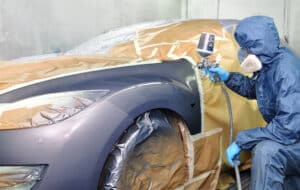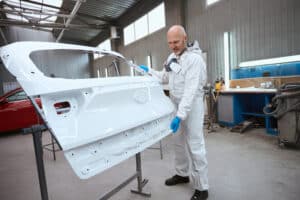Becoming a Collision/Auto Body Repair Specialist: Key Things to Know
Are you interested in pursuing a career in automotive body repair but not sure where to start? If you’re looking to move towards a more specialised position or want to gain a better understanding of the industry before deciding which role to go after, we can provide you with all the necessary information to get started.
Here, we’ll be exploring the variety of paths you can take to train and become a collision repair specialist or similar. We’ll cover everything from apprenticeships and qualifications to the essential skills and technical knowledge required. This guide will equip you with all you need to know on your journey to becoming a collision or auto body repair specialist.
What Career Opportunities Are Out There for Auto Body Repair?
If you aspire to work in an auto repair shop or manage one, there are various paths you can take to achieve your dream. The industry offers a wide range of career options, from working in collision repairs to insurance.
Below, we’ll help you gain a better understanding of the different opportunities available and guide you on how to pursue your ideal body shop career.
Collision Repair
Working in collision repair can be a satisfying job simply because you’re able to witness the results of your work almost immediately. As a collision repair technician, you will be responsible for assessing the damage on a vehicle, determining whether the damage has affected the structural integrity of the vehicle, checking if any mechanical repairs are required, and finally restoring the vehicle to its original condition, both in terms of appearance and functionality.

Vehicle Restoration
If you’re looking for a flexible, creative and exciting career, vehicle restoration might be the perfect choice for you. Vehicle restoration can be as niche or as broad as you like, depending on your interests and skills. To become a successful vehicle restorer, you’ll need to have a good understanding of automotive mechanics, as well as an appreciation for the aesthetics of a range of vehicles. You’ll use a variety of tools and techniques to restore a car to its original condition, including sandblasting, welding, painting, and upholstery.
Classic car restoration is one of the most popular and rewarding paths in vehicle restoration. It requires a deeper knowledge of classic vehicles and a passion for preserving their history and beauty, which is how many individuals find their way to this type of career. Restoring a classic car often involves a combination of old-school and modern techniques, as well as a keen eye for detail and a commitment to quality.
Body Shop Management
A career in body shop management is an ideal choice for those who have a keen interest in all aspects of auto repairs. As a manager, you will be responsible for overseeing a team of collision repair technicians, or even an entire body shop, and getting to witness how the different roles collaborate to complete collision repairs. It’ll also be your responsibility to coordinate and distribute tasks within the body shop to meet KPIs and SLAs.
Typically, a role in management is something that people work their way up to after gaining experience in one or more areas of the industry. Whether you started as a VDA or a vehicle restoration technician, anyone with a drive and passion for all things related to car repairs can pursue a successful career in body shop management.
Insurance
When it comes to body shop repairs, working in the insurance field is a bit different than some of the other career paths. For example, vehicle damage assessors (VDAs) have a variety of responsibilities, including setting up and creating computerised repair estimates, communicating important information to customers regarding pricing and completion time, and keeping track of the repair’s progress.

An insurance career typically involves more customer-facing roles and requires knowledge of various software programs for calculating repair estimates and tracking progress. However, it can be an easier pathway into the industry if you have little knowledge of how to tackle repairs yourself but have experience in customer-facing roles and understand the basics of bodywork and mechanics.
Auto Body Repair: Job Titles Explained
Navigating the auto body repair industry can be tricky, particularly when it comes to understanding the various job titles and career paths available. With so many technical terms and industry jargon to contend with, it can be challenging to know which roles could lead to the career you want. To help, we’ve put together an overview of the different job titles within auto body repair, along with explanations of what each role entails and typical responsibilities.
Body Technician (or “panel beater”)
A Body Technician or Panel Beater should be skilled in panel removal and replacement, straightening and filling, body alignment, and have experience in welding and bonding. This job is typically best suited to those who have worked as an auto body repair specialist for a few years and can potentially earn a salary ranging from £40,000 to £50,000, depending on your qualifications and experience. Desirable qualifications often include Automotive Technician Accreditation and a Level 3 certificate in automotive body repair technology or similar.
SMART Repair Technician
A SMART Repair Technician’s main responsibility is to use specialised technology and equipment to work on small to medium repairs without removing entire panels of a vehicle. They provide an alternative solution for customers who want a low-cost quick fix that doesn’t compromise on quality. These technicians are expected to thrive in a fast-paced environment and be happy to work individually. While the SMART repairs can vary from fixing paintwork chips to alloy wheel refurbishment, the list of day-to-day duties will stay relatively similar. Masking and preparing vehicles for paintwork, polishing, repairing small damages and mixing paint will all be part of a typical day in this role.

Vehicle Paint Sprayer
Although the job title seems to only cover painting, there’s a lot more to this role than you might initially realise. From preparation work to colour matching and managing your workload effectively, a Vehicle Paint Sprayer typically handles anything paint-related within the body shop. Preparing, applying and finishing paintwork to a high standard requires excellent attention to detail, knowledge of health and safety and often also calls for a couple of years of experience in a similar role.
Within this role, you’ll need to work as part of a team while also being confident working on your own initiative. It can offer lots of variation since you could be working on a variety of repairs, and this role can offer a great vantage point to learn how others in the industry work.
Auto Body Repair Personal Skills
Personal skills can have a huge impact on which roles suit certain individuals best within the auto repair business. The following list contains the most desirable personal skills for those wanting to pursue a career in the industry.
- Attention to detail: From deciding repair timelines to ensuring you achieve the perfect finish, attention to detail is an essential skill to possess and work on in the auto body repair industry.
- Determination: Being determined to find a solution and give customers the results they want at expected standards will drive you to meet targets and ensure you try everything.
- Ambition: Having a desire to achieve and succeed can push you to progress in your career and push past any difficulties, alongside keeping you motivated to learn new skills and techniques.
- Good time management: More often than not, you’ll be working to agreed timelines. Individuals should be prepared to manage their time effectively to meet deadlines and fulfil commitments to customers.
- Initiative: A drive to continue learning and expanding your knowledge and skillset will ensure you can keep up with new techniques.
- Interpersonal skills: Especially for careers in insurance and management, you should have good interpersonal skills to ensure efficient communication takes place in the body shop and with your customers.
- Problem-solving skills: Sometimes it might take some investigation to discover the full extent of the repairs needed on a vehicle or you might need to work on a tailored solution for a vehicle requiring more complex and unique restoration. Being able to problem-solve a range of issues that might crop up can be handy for maintaining efficiency within an auto repair shop.
Auto Body Repair Technical Skills

Of course, technical skills are incredibly important to gain as you progress in your auto repair career. While these shouldn’t necessarily be expected from somebody at the very beginning of their career, individuals with any amount of experience should be willing to show an interest in the industry and be prepared to work on the following as they grow into their roles.
- Repair skills: One of the biggest requirements for working in auto body repairs is, of course, your repair skills. Whether you’re going for a specialised or general role, practice all different repairs as often as you can and try different techniques to find what works best for you.
- Finishing & refinishing skills: One of your highest priorities should be learning how to achieve the best finish at the end of a job. Pay attention to how other professionals tackle the finish or refinish to build this skill and show off your attention to detail.
- Masking: Tapes and adhesives are essential tools for carrying out high quality repairs. One of the first tasks you’re likely to be given in a repair body shop is to mask off the vehicle in preparation for the repairs, so you should know which tapes to use, how to apply them, and when to remove the masking tape.
- Correct and safe machinery & tool use: Knowing which machinery and tools are used in the industry and how to handle them safely is a good starting point.
- Product knowledge: From paint to filler, do your research to find out which products are best suited to different repairs. If you’re learning on the job, take the time to find out what each product does and when it should be used.
How to Get into Auto Body Repair as a Career
Looking for a way into the industry? Whether you prefer to learn on the job, in a classroom or from others with years of experience under their belts, there are plenty of options available to help you launch into your auto body repair career.
Apprenticeships
Apprenticeships are a great way to learn your auto repair trade on the job while getting paid. Not only will you learn from seasoned professionals, but you’ll also be able to work towards a formal qualification at the end that will help you gain the knowledge and skills needed to succeed. Many individuals choose to complete an apprenticeship because it provides them with much-needed experience to help with a smooth transition into the industry.
MET (Mechanical, Electrical and Trim) apprenticeships are a relatively popular choice since they involve learning from others how to identify damaged mechanical and electrical components on a damaged vehicle, alongside removing and refitting these components before and after body repair work has been carried out. Working towards a MET qualification is a great start for those seeking a career in collision repairs.

It’s important to note that some apprenticeships will require some experience in a body shop before accepting an application. So if you already know that this is something you want to do, it’s worth getting a few days of work experience in at a local body shop or auto repair workshop if possible since this can help you stand out against the other applicants.
College Courses
A college course is a great way to enter the automotive body repair industry. You can obtain qualifications ranging from level 2 certificates to T-Levels up to degree level, similar to an apprenticeship. The main difference is that you won’t necessarily be gaining real-world experience, although this does allow more time to get to grips with the technical terms and practice your skills in workshops.
Many of these courses will only require five pass grades at GCSE, which means that it can be a much easier entry into the field than an apprenticeship.
Other Qualifications
Alternative qualification options are available, which can be a great option if you’re switching industries and want to learn in your spare time.
The Automotive Technician Accreditation (ATA) is the most highly recognised and shows employers that you’ve done your research. It also demonstrates your level of knowledge and skill since the accreditation will test your ability to perform specific services and work on certain types of vehicles.
Every path into the industry is likely to look slightly different. So whether you choose to apply for an apprenticeship or college course, have bucket-loads of experience or none, we wish you every success in your endeavour for a career in the collision or auto body repair industry.
For more advice on your professional body shop career, check out our selection of guides available on our blog.


